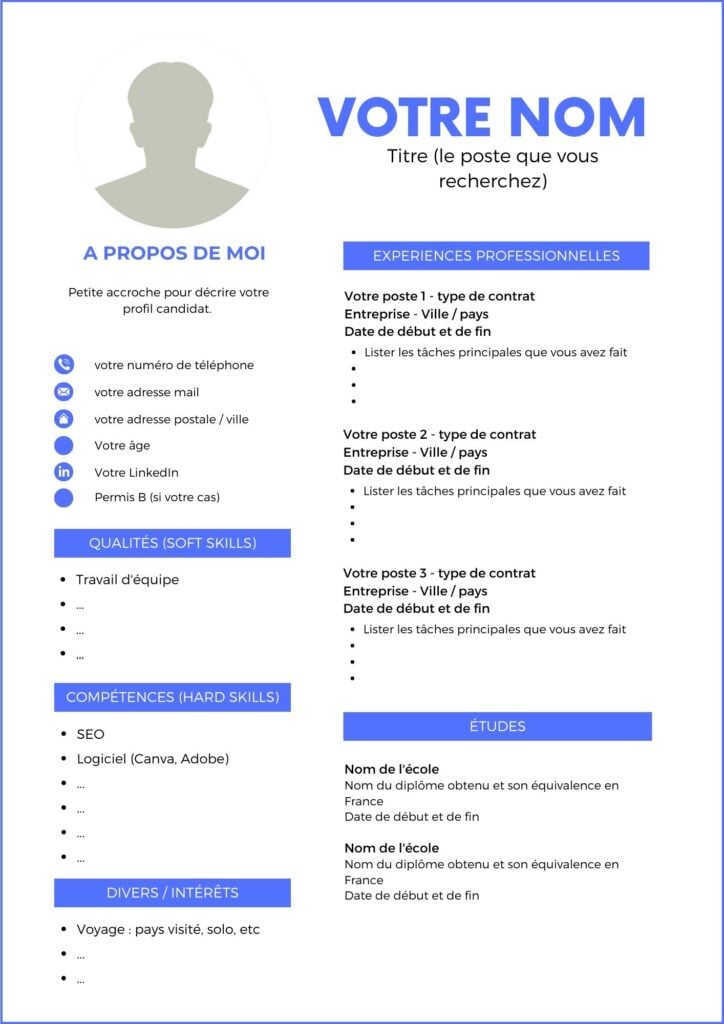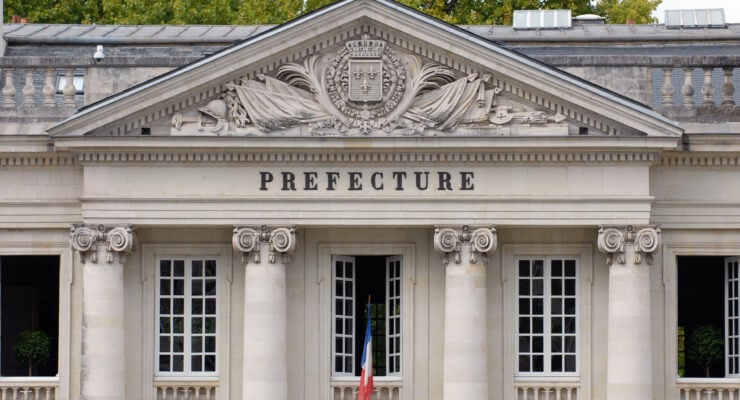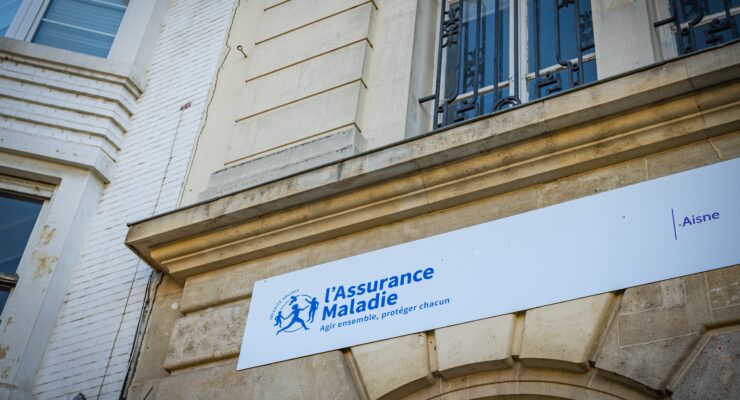CV and cover letter
You will likely come across many job listings in English and French. You should apply in the language of the listing. If a listing is bilingual, you can choose the language of your application. CVs in France might be different from what you’re used to. Regardless of whether you apply in French or English, it is customary to include:
- Your photo
- Age and nationality
- Address
- Indication if you hold a driver’s license
In French, CV (curriculum vitae) translates to resumé. Don’t say résumé because in French that just means summary.

Structure of a French CV
At the top, write your first and last name, telephone number, and email. Also include your date of birth, a local address, and indication if you have a driver’s license. Also include a link to your LinkedIn profile.
Profile bio
Briefly introduce yourself in a couple of sentences. You can describe your objectives or your qualifications. Present yourself in a way that will make you stand out and keep the recruiter’s attention.
Professional experience
Your professional experiences should be listed from newest to oldest. For each one, include your role, the name of the company, the city, and your employment period. You can also add your employment type, which was explained in chapter 3.
The biggest opportunity for differentiation in this section is the tasks and responsibilities you had on the job. In North America, it is typical to quantify impact with numbers, but in France it is more common to keep things high level. List the responsibilities without going too much into detail.
English terms are quite common even in French CVs, especially for job titles and specific skills. For example, one would likely use Community Manager rather than gestionnaire de communauté. Do some research to see which terms can remain in English, if you do translate your CV into French.
Education
As with work experience, list your relevant education credentials in reverse chronological order. Indicate the name of the school, the city or country, the start and end dates, and your majors or specializations.
It’s safe to assume that French employers will not be familiar with your school or diploma type. Consider converting your credentials into their equivalents in France.
Here are the some common equivalencies:
|
Degree in English
|
Equivalency in French
|
|
High school diploma
|
BAC
|
|
Undergraduate diploma (i.e. bachelor’s degree)
|
BAC+4 or BAC+3 depending on if your program was 3 or 4 years. Don’t list anything higher than BAC+4 (even if you did extended internships or co-ops) because BAC+5 and above denotes masters degrees.*
|
|
Masters
|
Master 1 (if you had 5 years total of post-secondary schooling) or Master 2 (if you had 6 years)
|
|
PhD
|
Doctorat
|
*Undergraduate degrees in France last 3 years.
Soft and hard skills
Soft and hard skills are terms used in French professional contexts. Soft skills are ones that are unquantifiable, such as leadership and teamwork. Hard skills are more technical, such as data analytics or coding. Hard skills are among the most valued by employers in some fields. It is important to therefore adapt the skills you list to correspond with the needs of the jobs and fields you apply to.
Hobbies and interests
Though not mandatory, you can show a bit of your personality by listing some personal interests. Try to be specific, as vague terms such “travel” or “sports” won’t add much to your profile. For example if you enjoy travelling, explain what type of travel you’ve done, how many places you’ve visited, or what you’ve learned on the road.
If you speak more than one language, be sure to include that in your personal bio or skills. Keep your CV to one page (single sided), clean and simple. If you are in a visually creative field, then you can consider tailoring the format to your taste.
Cover letter
Cover letters are often expected by recruiters in France, with the exception of entry-level positions that don’t require any specific qualifications.
The cover letter is a good chance to stand out by highlighting your relevant professional accomplishments. Avoid repeating what is already on your CV, but rather bring new information that substantiates or more vividly illustrates your points. Try to personalize your cover letter to the job or reader. A letter that is too generic is easy to spot by recruiters.
Structure of the cover letter
Cover letters in France generally consist of three parts:
- Paragraph 1: Address your letter to the correct point of contact and specify the exact post that you are applying for, since a company may have multiple at any given moment. Finally, include a hook to keep the recruiter reading.
- Paragraph 2: Explain why you are applying. This is where the recruiter will learn more about you and things that are not detailed in your CV. Market yourself by highlighting the qualities and experiences that make you the ideal candidate.
- Paragraph 3: Explain what you can bring to the company, and why you believe you and the company are a mutually good fit.












 Français
Français English
English





(2) Comments
Hi there, do I need to get a tax number or some type of verification like a Social Security number in order to be paid by the French employer? Thanks in advance!
Hi Megan. As a Working Holiday Visa holder, no you do not. I invite you to read this for more details. https://pvtistes.net/en/dossiers/key-documents-procedures-whv-holders-starting-a-job-france/
{{like.username}}
Loading...
Load more